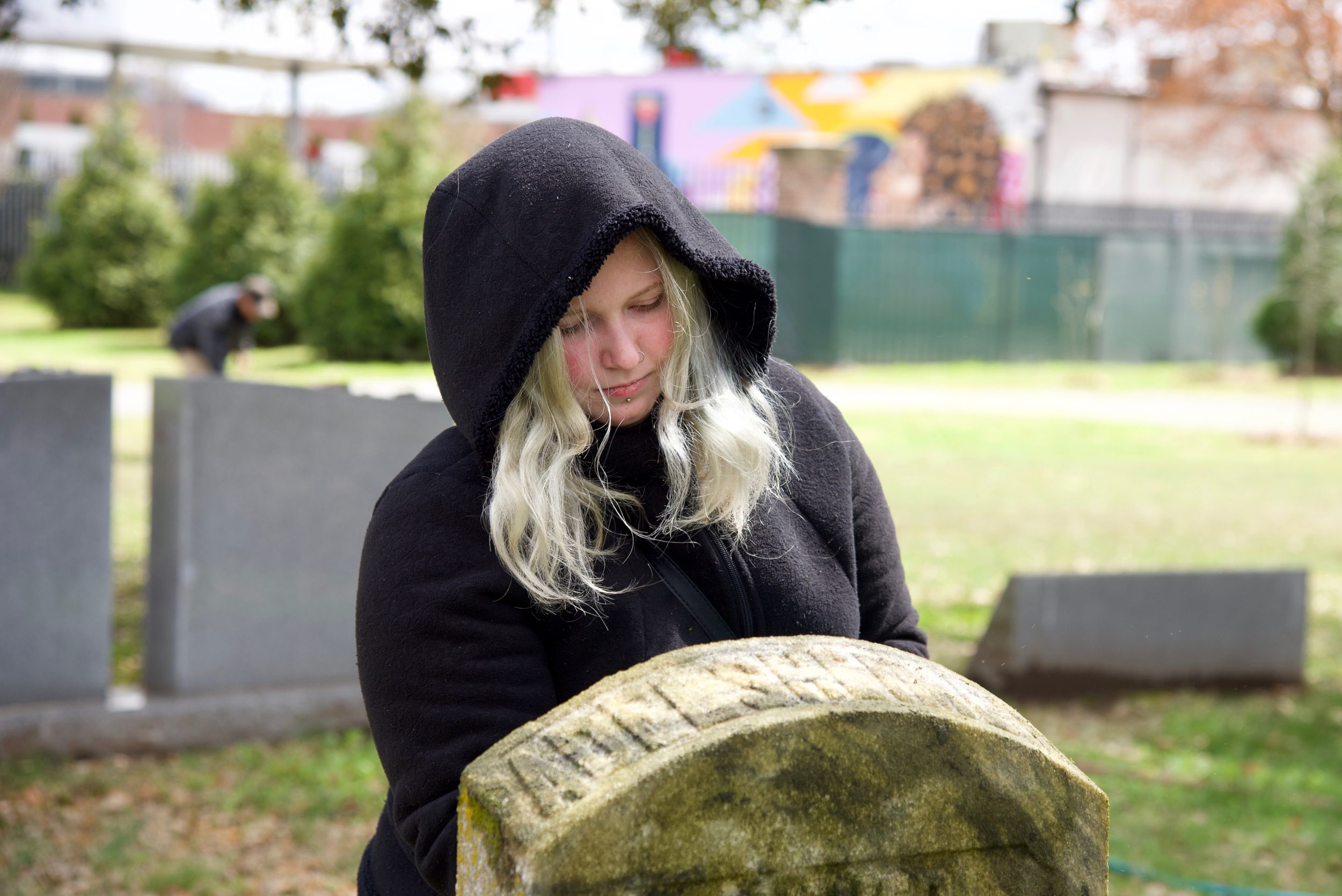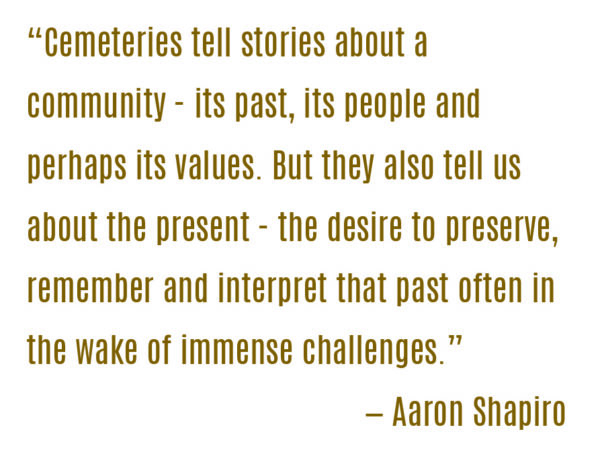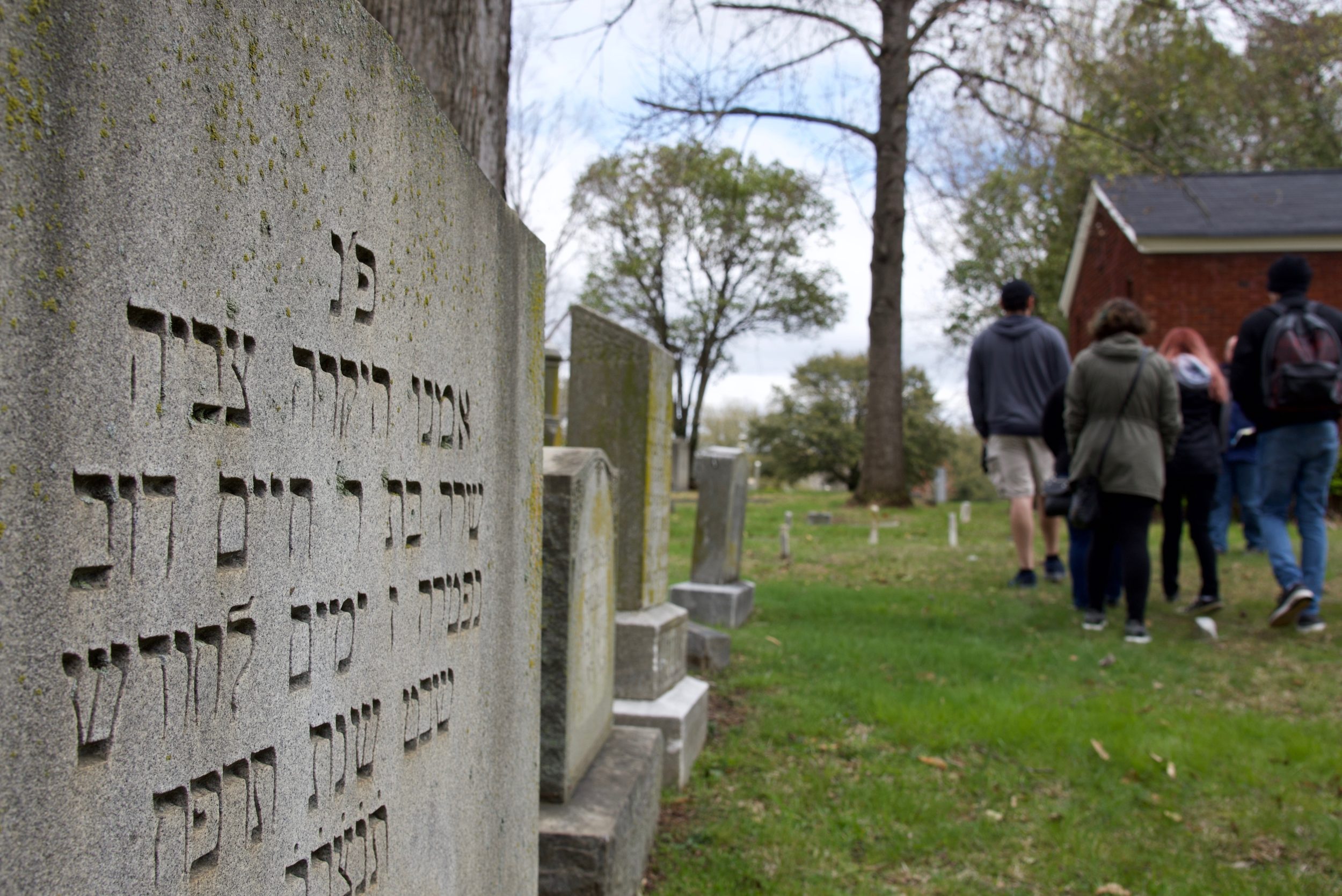UNC Charlotte historian Aaron Shapiro thinks deeply about the impact of society’s resting places and the importance of protecting and understanding them. In his co-teaching of a history class called “Preserving Memory in the Digital Age,” Shapiro strives to help students broaden their perspectives on cemeteries and their surrounding communities, through in-depth research and class work.
As the cornerstone of the class, the students traveled to Poland in late May to do stabilization, preservation and interpretive work at cemetery sites. Many Jewish cemeteries in Eastern Europe remain under constant threat due to neglect and lack of awareness about their presence and condition.
“I would hope that the experience – of the class and the time in Poland – would contribute to students always asking questions about the world they inhabit,” Shapiro says. “That they not only challenge seemingly dominant narratives and investigate their emergence and acceptance, but also consider ways in which other narratives have been minimized or silenced. I don’t imagine many of the students will end up as public historians. In fact, most of the students aren’t history majors. But I do think that their experience together will encourage them to learn to listen to a multitude of views and perspectives.”

Erin Robinson cleans a gravestone at the Hebrew Cemetery.
Shapiro and Talli Dippold, assistant director of the Stan Greenspon Center for Peace and Social Justice and Director of Jewish Life at Queens University of Charlotte, have taught this course as a team, with students enrolled from both universities.
“Our goal is for students to develop a deeper appreciation for the complexity of historic events, using the Holocaust as a case study,” Dippold says. “By spending a semester studying public history and the Holocaust on our two campuses and in our Charlotte community, and then visiting the historic sites in Poland that are connected to World War II, our UNC Charlotte and Queens University students will gain a deeper, richer and more nuanced understanding of the complexity of history.”
The project has employed community-based historical research, combined with a humanities curriculum and global focus. While in Europe, students visited Auschwitz,
numerous museums and world heritage sites, as they explored how historians address commemoration and memorialization. The project immerses students in public history and offers an opportunity to consider how historians partner with the public, engage questions of memory and develop material for public audiences using new digital tools.
For UNC Charlotte history major Erin Robinson, the class has offered a glimpse into the communities around her and how historians reach out to the public in an effort to preserve memories. “These things have all made me want to continue working and volunteering in the Jewish community, and other minority communities after this class ends,” Robinson says. “For me, these communities add a richness and diversity to our society, which if it were lost, here in Charlotte or anywhere else in the world, would be a tragedy.”
The work helps students learn what it means to be global citizens and to be aware of the world around them and their role within the world, Robinson says. “If tragedies like genocides are forgotten, it has the negative effects of erasing a people’s contributions to society, it delays the pursuit of justice for crimes against a people, it plunges a people into further victimhood,” she says.
The hope is that the program will have a lasting impact not only on the students, but also for the people who live in the communities they are visiting.
“Preserving memory isn’t simply about taking a photograph and posting it on Instagram, but rather involves ongoing and meaningful dialogue with others in the world,” Shapiro says. “And it involves acting to preserve and maintain those very places where memory resides – whether a cemetery site in Poland, a lone individual farmhouse remaining in a sprawling urban landscape or any number of places across the globe that are important to individuals and communities.”
While the work holds the potential for broad impact, it also has affected students in a more intimate way.

Jacob Jordan, a finance major and sociology minor at UNC Charlotte, learned more about cultures different from his own. As he was growing up, he does not remember knowing someone who is Jewish or knowing much about the history of Jewish people. “Projects like this educate the community on Jewish heritage and why it is important to preserve it in today’s society,” he says. “Preserving memory is a way to show respect for generations before you, but it is also important to preserve memory so it will be there for future generations to learn about.”
For Michael Farrell, a math major at Queens University, the class prompted conversations with his grandfather about his family’s history. Members of the family had immigrated to the United States from Russia, Ukraine and Poland. After the Holocaust, his family did what they could to help other Jewish people.
“My great-grandfather was a dentist in New York who out of his own kindness replaced a lot of the golden and metal teeth that were removed from the survivors’ mouths when they were in concentration camps,” Farrell says. “My grandfather has a lot of pride in his father. He said that when his family had looked back, they didn’t realize the full impact of what was going to happen. They just felt uncomfortable with what was going on and decided to move.”
Farrell initially was unsure he would find the class particularly relevant to his future career teaching math. Yet, he has found meaning in what he is studying. He says he will take this realization into his classroom when he becomes a math teacher and is faced with students who question the relevance of math. “By applying this, I can try to provide them with an understanding of why they are learning math and hopefully make sure they are getting something out of it,” he says.

Students visited the Hebrew Cemetery of Charlotte.
During their study abroad trip, students have kept journals, documenting their academic learning and their personal observations. They are using these as one resource for sharing their findings with people in Poland and in Charlotte. To help the students with this project, organizers reached out to Anna Brzyska, who had previously done work in Brzesko, working with the mayor and other local officials of Brzesko.
“The opportunity to work with local students and community members in Poland offers our students exposure to the ‘everyday reality’ of life in another country,” Dippold says. “Hopefully, this will increase their appetite for international exposure in order to learn about global historical events not only from books and the Internet but from the authentic sites.”
Preserving Memory in a Digital Age received support from the Blumenthal Foundation, the Jewish Federation of Greater Charlotte, private donors, Anna Brzyska, and the mayor and local people of Brzesko.
Words: Madison Bradburn | Images: Lynn Roberson








